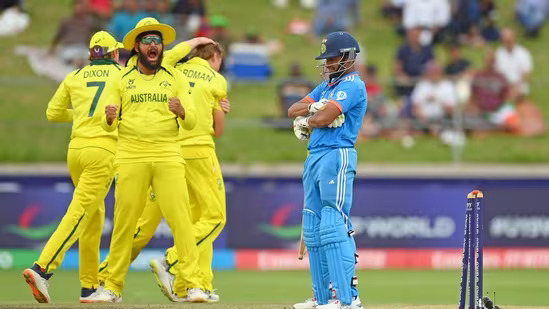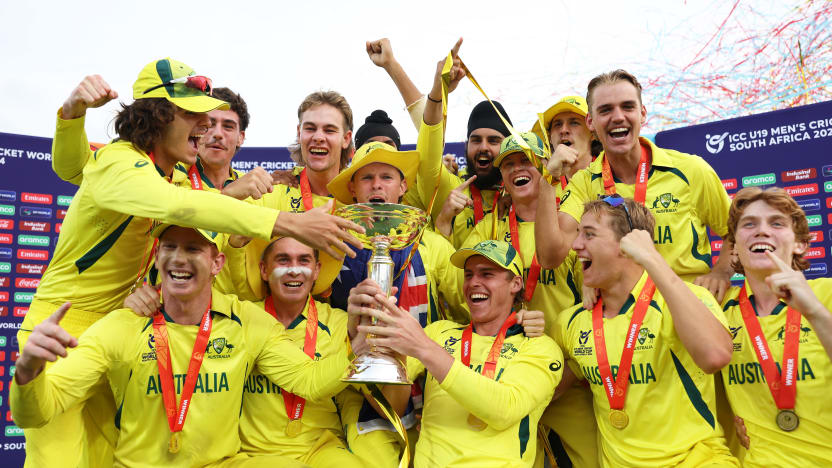India has recently found themselves on the losing end of many championship matches, often at their expense. Over the last seven months alone, they have triumphed against India three times in international tournament championship matches: first at The Oval during a World Test Championship (WTC) final, then Ahmedabad when winning the One-Day International World Cup, and now Benoni during the U-19 World Cup summit match play-off.
Australia displayed an exceptional performance reminiscent of their seniors when it counted, defeating India by 79 runs to win their fourth U-19 World Cup championship.
They overcame Pakistan’s close call in the semifinal and an unpredictable surface described by commentator Ian Bishop as having “significant lateral movement, bounce, and carry.” In their final match against India – on an unprecedented fast wicket with significant lateral movement, bounce, and carry – Australia bowled them out for 174 runs, which set an Under-19 World Cup record, while their own 253 for seven was selected as the highest total ever posted in an Under-19 final match- ever posted during an Under-19 World Cup match – setting an Under-19 final record score for either team ever recorded before!
Australia’s medium-paced bowlers were undoubtedly successful on the surface. Callum Vidler and Mahli Beardman caused havoc among India’s batters using their quick pace; Callum Vidler, in particular, caused numerous difficulties for India’s batters;
Charlie Anderson and Tom Straker used tight bowling to maintain pressure before off-spinner Raf MacMilan took advantage of it to secure three wickets.
Vidler struck first when he refused to answer the broadcaster’s query about who the fastest bowler among them was, swiftly bowling Arshin Kulkarni for low costs. At the same time, Adarsh Singh and Musheer Khan managed to stay alive during powerplay without being killed off. Beardman came in as a second-change bowler, running through India’s top order without issue and picking up speed during his bowling spells; even so, Indian batters seemed reluctant at best.
Beardman was deeply influenced by Australian legend Dennis Lillee during his development, as is true for many pacers from his region. Three years after requesting him to mentor him under him, he initially declined his request: Lillee stipulated he wouldn’t collaborate until they reached 16; after some waiting and convincing, Beardman managed to convince DK (Lillee) of this fact and eventually got him take notice when he went 15. Before their semifinal match against Pakistan, Boardman told reporters of this progress and finally convinced him he took him under his wing a decade after making his request three years earlier: DK (Lillee) stipulated he would only collaborate once any 16-year-old had reached 16th. Beardman had reported before this encounter, telling reporters, “DK stipulated he wouldn’t collaborate until then,” Beardman said before speaking publicly, telling them about this story, and finally convincing him to take an interest. “DK (Lillee) stipulated that when I finally convinced him to take me seriously enough”. Beardman reported before their semifinal match against Pakistan.
Beardman with his Quick-Fire Firearm
Beardman, one of the quickest players in the competition, began by striking an early wicket, which resulted in Musheer Khan being dismissed despite facing tremendous pace throughout his 33-ball stay – Harry Dixon dropped him at slips. Soon after that, Beardman struck again, this time dismissing Uday Saharan, India’s captain and leading run scorer during this tournament; Saharan hit a straight shot that Hugh Weibgen caught at backward point before Adarsh Singh finally succumbed to Beardman’s bouncer.
During post-match presentations, Lillee and his strapping bowler expressed their appreciation to Lillee, saying things such as, “I attempted to smash short balls into the wicket by backing them up for several runs. Thanks to DK, I have gained invaluable psychological information when considering my bowling technique in various field settings. He was incredible, making every bowling session an absolute pleasure”.
India would suffer significantly if MacMillan were allowed to take three wickets. It seemed inevitable as Sachin Dhas, seemingly undaunted by pacers, was struck out of the game by part-timer Raj Limbani on his first delivery and removed with one strike; Dhas’ World Cup campaign had come to a close with Aravelly Avanish chipping back one straight back at him for a duck which gave MacMillan the edge needed.
Finally, Limbani made himself available to end India’s last hopes by taking on responsibility himself; ultimately, India lost by just one run off MacMillan, taking all three wickets. India lost by one wicket. Raj Limbani dedicated himself entirely to making sure India lost it by committing himself and taking on his all-out commitment against MacMillan by taking three wickets from MacMillan.
Even though the Australian batting was inexplicable, their bowlers likely regret permitting Australia to score 253 runs for seven wickets in seven innings. As Sam Konstas was dismissed with 16 runs scored after 2.3 overs, Harry Dixon (42) and Hugh Weibgen (48) came together to score 78 runs for their team as they hit four four-wicket partnerships between them for two wickets.
Harjas Singh rose to the occasion despite losing two wickets while adding five runs. Even though he only scored 49 runs in the competition, he posted the highest individual score with 55 off 64 balls – an achievement they must all be proud of. Southpaw Shane Watson hit three sixes against spinners to show his remarkable power against them and deliver Australia a decisive win. Although Australia lost several wickets during the middle overs, Oliver Peake’s 46-ball innings that was not out gave them the edge in the last over and gave Australia their advantage back. None of the medium pacers, such as Raj Limbani (3/38), made an impactful contribution that cost significant money.
India’s skipper Saharan was left lamenting his batters’ failure to execute their plans against Australia’s pacers, which was incredibly frustrating. We didn’t spend much time in the game today but played hasty shots. Although well prepared for today, our plans did not materialise.” Alternatively, they were competing against an Australian team which is an equal match-up compared to any in global cricket, being victorious every time.
397 Uday Saharan, captain of India, came away from this competition with scores of 150 or higher – making him the player with the highest run-scoring performance.
4. Australia won their fourth under-19 World Championship since 2010, marking their fourteenth ICC crown during this under-19 World Cup championship victory.

